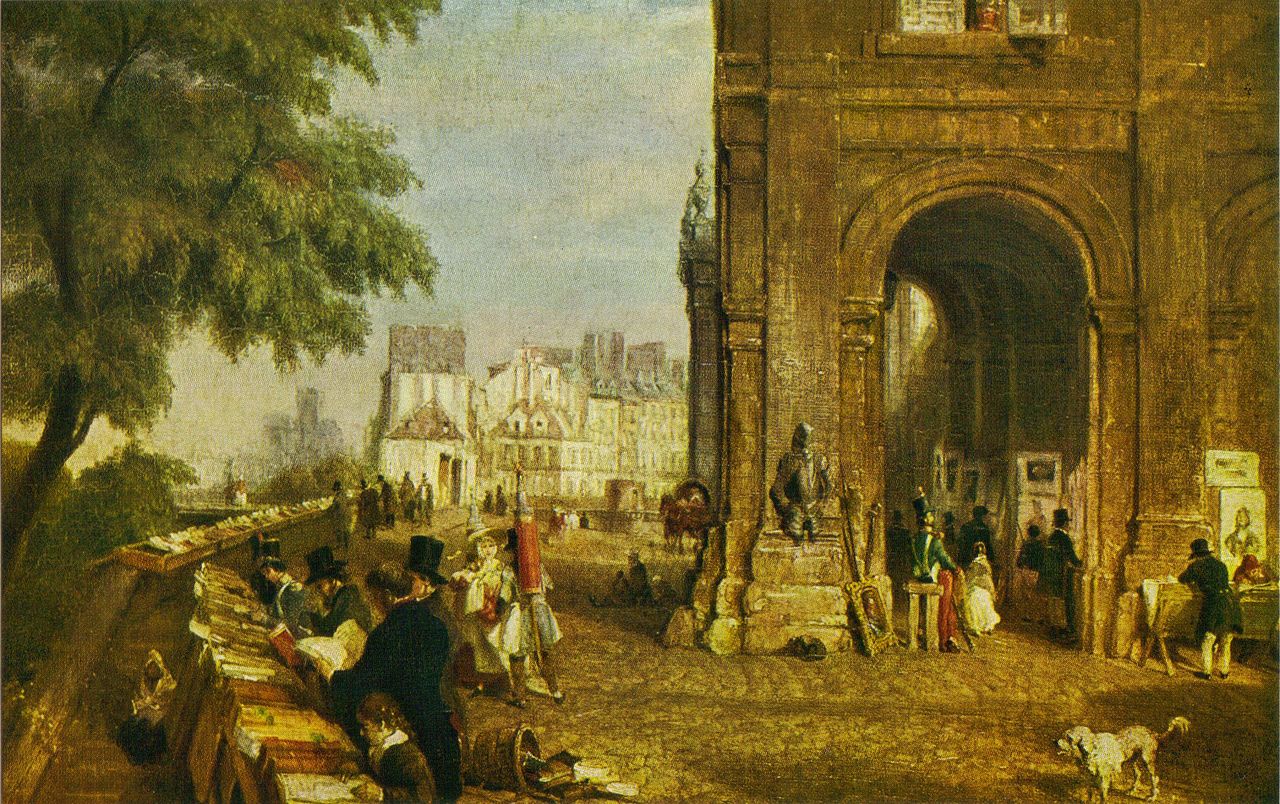
The venerable Volkswagen Beetle will soon disappear (“Volkswagen Kills Beetle, Ending Production of Iconic Vehicle,” Wall Street Journal, September 13, 2018). After eight decades on world markets, including two decades of the revamped model, the Beetle is now manufactured only in Mexico (I was going to write “by Mexican rapists,” but I controlled myself at the last moment), and production will stop next year.
When the news broke out, I tweeted a banality:
When consumers don’t want it or are not ready to pay its full price, it is not produced in a free enterprise system.
It would be inefficient and ludicrous if UNESCO (the United Nations Educational, Scientific and Cultural Organization) were to declare the Beetle an icon of cultural heritage, and its producers could hope to get production subsidies. Or would it be?

One of Paris “bouquinistes”—owners of bookstalls selling old books along the River Seine—wants to have the “profession” (somewhat more modestly “métier” in French) declared an “intangible cultural heritage” by both the French government and UNESCO (“The Storied Bookstalls of Paris Fight for Survival,” Wall Street Journal, September 14, 2018; and “Les bouquinistes de Paris se verraient bien au patrimoine culturel de l’Unesco,” Le Monde, April 20, 2018).
Fortunately, UNESCO’s rules prevent a national government from presenting more than two projects per year. Otherwise, under the pressure of special interests, everything would soon be a very intangible cultural heritage.
The bouquinistes’s problem is that their customers don’t want their products anymore. Many of the French read or buy their used books online. Along the Seine banks, tourists apparently prefer to buy knicknacks like Eiffel Tower keychains, love locks, or baguette-shaped bottle openers. Thus far, there seems to be no call for subsidizing bouquinistes, except for the provision of night lighting. But who knows what is coming? For one thing, the “intangible cultural heritage” label would probably lead to more regulation of what the bouquinistes are allowed to sell.
It would be nice if the city government would only loosen the regulations to which the bouquinistes are already subject. That might solve part of the problem.
Paris bouquinistes have a history dating back to the 17th century at least. (If you are reading this post online in its original EconLog incarnation, the featured image represents a 1846 painting by William Parrot, “Quai de Conti,” where you see some bookstalls on the left.) In a sense, it would be sad to see them disappear. Perhaps it was also sad to see them crowd out whoever was using their space on the river banks three centuries ago: other tradesmen, horse-drawn carriages, who knows? Freezing the pre-bouquinistes Paris in time would have been as criticizable then as it would be to freeze today’s bouquinistes in what will soon be the past. The status quo used to be the new changing times.
The banality needs repeating for it’s a good policy guide: if there is no consumer demand to justify the production of something, the thing should not be produced, except by people who want to do it out of charity or as a voluntary production of a public good. In general, the French have lost the ability to engage in such voluntary actions, precisely because the state is the repository of all hopes.

READER COMMENTS
john hare
Sep 17 2018 at 8:35pm
For the time it was produced, the original beetle was one of the best cars in the world for people stupid enough to be born as poor as I was. Economical to buy and many repair options that didn’t involve a dealer. Friends of mine would rebuild the engines in their garage over a weekend.
I my opinion, the concept,if not the design would still be viable today if not for all the government mandates. By the time you add air bags, anti lock brakes, all the electronic gizmos, and automatic transmissions, you might as well build a more expensive/marketable car.
Pierre Lemieux
Sep 18 2018 at 12:06am
John: I agree with you: it was an inexpensive, solid, durable car–provided you were not involved in a front collision. I had two, and I loved them. One problem is that, in the 70s, small Japanese cars arrived on the market and, for the same price, offered more (to the taste of most people).
Ahmed Fares
Sep 18 2018 at 9:45pm
Question: What is Mexico’s major export?
Answer: Mexicans.
I was debating a guy who wanted to block all manufacturing imports from Mexico. He also didn’t like Mexicans. I told him he had to choose one. More imports from Mexico means less Mexicans crossing the border.
Besides, it’s cheaper than building a wall.
(Note: The joke above is not meant to be offensive. I like Mexicans. Also, I’m Canadian which means that I’m not personally affected by this issue. It was to illustrate the inverse correlation between trade and migration. In fact, the flow of migrants is actually reversing, as the following shows.)
“From 2009 to 2014, Pew Research estimates that 1 million Mexicans and their families (including U.S.-born children) left the U.S., while 870,000 Mexicans arrived.” —Washington Post
Henry
Sep 19 2018 at 3:25pm
At present, Germany is the number three exporting nation just behind the USA. In April of 1945, German exports were quite low and the “Made in Germany” tag probably had a negative value in much of the world. Starting in 1948 VW began making the Beetle. Exports started a year or two later. I wonder if the role of VW in building German international trade has been studied. Obviously, firms like Zeiss have a international reputation for high quality that goes back to the nineteenth century, but I’d guess that VW was important in adding luster to German goods.
Comments are closed.